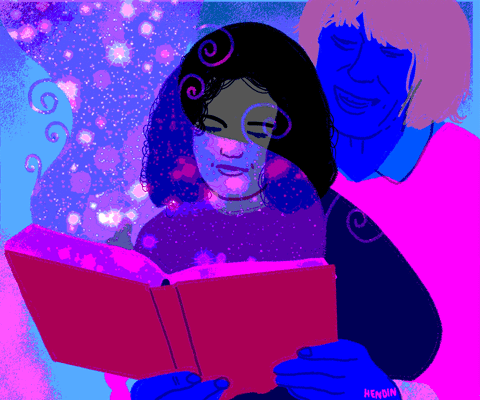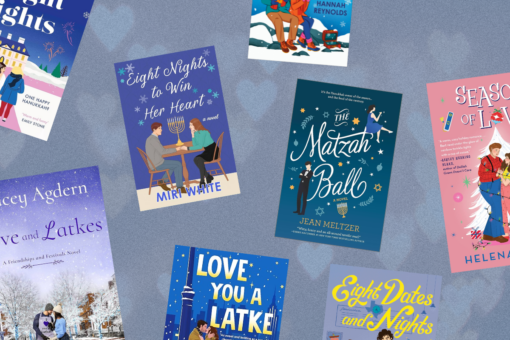“Tell us a little about your family background.” This was a phrase that became all too familiar to me as I tried to get involved with Jewish organizations. Whoever was in charge of vetting me would begin the interrogation with this question, and I would immediately feel the dread set in.
I would always start with my father’s side. I would say how my dad grew up in various cities around America and Canada, moving every time his father, a rabbi, started with a new congregation. This part of my family’s history always went down easy, but then came my mom.
I would always try to breeze past it, mumbling something like “and my mom converted before I was born,” hoping they wouldn’t think quickly enough to catch it, but they always did.
I feel a bit sick admitting it, but for a while, my mom’s conversion was my dirty little secret. Inevitably, upon hearing that salacious detail, whichever recruiter, director, or principal who was interviewing me would get a little hot under the collar. Once after divulging that information, a representative for a Jewish summer program coolly remarked that if that was the case, then I wasn’t Jewish. While that is both untrue and unprofessional, it pinched a nerve somewhere deep.
When I first started to get this kind of denigration, I used to joke that my mom made sure that some necessary new blood was introduced to the Jewish gene pool — a convert a day keeps the Tay-Sachs away, after all. I now know this kind of lighthearted pushback was a coping mechanism for a phenomenon that really gnawed at me. At some point after my transition from Jewish day school to a public high school, where I was almost certainly the only Jew within the student body, my Jewish identity became far more important to me than it ever had been. The result of my tenure as “token Jew” was a fevered curiosity which asserted itself suddenly and compelled me to go to Israel upon graduation.
I spent 10 months post high school at a religious institution in Jerusalem, and to put it succinctly, my time there was complicated. My mother’s conversion was a point of contention on more than one occasion that year. I felt a sort of covert inferiority throughout my entire time there, like at any moment I would be exposed as a fraud. That said, my experience in Israel was also revealing. I credit those months in Jerusalem with helping me define in specific terms why Judaism is so important to me, and it was only once I had defined those terms that I realized why those tenets were the fasteners tethering me to this grand tradition.
My Judaism is more than just practice and spirituality, although that’s part of it, too. I feel a deep kinship with this community, and that kinship hinges upon a few deeply entrenched Jewish values. I always admired Judaism’s emphasis on questioning. It seemed antithetical to the stereotype of organized religion as a rigid dogma whose followers are made to obey blindly and not make any waves. Judaism, contrastingly, seemed like high tide. I revelled in this idea that not only was I allowed to question the core texts and practices of traditional Judaism, but I was encouraged to question it.
I was also drawn to the way Jewish communities everywhere strive to preserve history, as well as hold society at large accountable for learning from it. My most significant discovery about myself was how much I relate to the Jewish practice of deeply engaging with texts and revelling in the written word.
Suddenly everything clicked. These central beliefs which drew me close to my Jewish faith were sown in me from a young age from — who else? — my mother. At the end of every day throughout grade school, my mom would not ask me how my day was, asking instead to tell her about an instance where I asked a good question. My mother was always the person with whom I would talk through my feelings whenever I learned about a difficult subject in history. From Holocaust education to the Rwandan genocide to the atrocities of Residential Schools in Canada, my mother always spoke to me with sensitivity and wisdom, underscoring how important it was that history inform the actions of today.
I also grew up in a household where as much as I was never without food, I was also never without books. I still fondly recall being 12 when, on a lazy Monday evening, my mother was driving me home from somewhere as we passed our local bookstore. I casually mentioned that I needed a new book. My mother careened into the turning lane, whipping that little blue Subaru into a frenzy so as not to miss the exit. All of those close reading skills that became vital fuel when I started to engage with sacred Jewish texts came from growing up as the reader my mother raised me to be. The Jewish people are often referred to as “The People of the Book,” and I know that the reason I identify with that is because my mom made sure I was a child of books.
There is a very real contingency in this community that still harbors skepticism towards Jews who have undergone conversion. People glance sideways at converts. Converts often have their motives questioned, their practice scrutinized, and many are told to hide the fact that they converted when dating so as to avoid an outright rejection. Our tradition speaks of a number of biblical converts, one of whom is Ruth, whose story is told in her own megillah which is read on Shavuot (come through, cheesecake). Our sages tell us that it is Ruth’s bloodline from which the messiah will eventually descend.
I don’t know about you, but it seems to me that there is a codified precedent to love and embrace those who choose, of their own volition, to become a member of the tribe. I’m no longer bitter or angry about the way I was made to feel in regards to my mother’s conversion, but I am ashamed. I’m ashamed that I ever allowed myself to feel less than because of it.
I am so proud to have been brought up to be an inquisitive, feisty, smartass of a Jewess, and I’m prouder to give all the credit to my mother. Take it from me, you don’t have to be born Jewish to have a yiddishe kop, but I’m glad to have inherited mine from a convert.
Header image via Rebecca Hendin/Giphy



